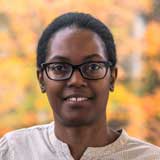Sonya Calnan
Professor of Energy Engineering – Mechanical, Electrical and Manufacturing Engineering
Professor Sonya Calnan’s expertise lies in low carbon energy, particularly fuel conversion and storage systems involving hydrogen and its derivatives. She hopes that her work will accelerate the widespread commercialisation of novel energy production and storage, providing clean and sustainable alternatives to current carbon intensive fuels – driving the green agenda and route to net zero.
Creating sustainable alternatives to carbon-intensive fuels
Hydrogen is a clean, carbon-free alternative to fossil fuels. It can be produced and stored in several ways and used to run our vehicles, homes and places of work – and fuel cells offer almost limitless potential for portable power. Although recognised as a fuel source decades ago, renewable hydrogen technologies are a relatively recent development. Sonya’s research is part of global efforts to realise a future fuelled by sustainable hydrogen.
The UN’s SDGs – adopted by all member states in 2015 – are ambitious targets to create "peace and prosperity for people and the planet”. SDG7 calls for “access to affordable, reliable, sustainable and modern energy for all”, noting that hydrogen has an important role to play in a successful energy transition.
My background is in electrical engineering. Working in this field, I very quickly developed an interest in renewables, particularly solar energy. Over the years, my focus has shifted to green hydrogen production and storage.
Gradually, my work has come to combine both technologies, exploring the use of low-cost chemical reactors for hydrogen production and use – powered primarily by photovoltaics. I’ve focused on the development of cost-effective non-platinum group catalysts as well as electrolysers, fuel cells, electrochemical pumps, thermochemical reactors and related units.
My enduring aim is to adapt these systems to drive sustainable, efficient energy conversion processes – including solar driven electrolysis for hydrogen production, synthesis and oxidation of zero carbon fuels, such as hydrogen and ammonia, as well as synthetic low carbon intensity fuels.
What excites me about my research is overcoming obstacles and making breakthroughs – finding ways to successfully scale up innovations for commercialisation so that they have real-world impact.
To support this research, I established laboratory facilities at Helmholtz Zentrum Berlin (HZB) – where I previously worked – for electro- and thermo-catalysts. My team of engineers, postdoctoral researchers and PhD students was diverse, joining me from around the world with expertise across a variety of fields – allowing us to approach the challenges of our work from a range of perspectives to find novel solutions.
We designed, modelled, built and tested chemical reactors – including electrolysers, fuel cells, electrochemical pumps and thermochemical micro-channel reactors. We secured funding through various collaborative research projects, including over €5 million directly for the lab from a variety of sources – testament to the significance of our work.
What excites me about my research is overcoming obstacles and making breakthroughs – finding ways to successfully scale up innovations for commercialisation so that they have real-world impact.
My research journey
My research has taken me on an international journey. I have studied and worked in Uganda, Germany and the UK.
I completed my undergraduate studies in Electrical Engineering at Makerere University Kampala, Uganda. When I graduated, I joined the Uganda Electricity Board as a Trainee Electrical Engineer. When the Board restructured, I secured the role of Standards and Specifications Engineer with one of the daughter companies, the Uganda Electricity Transmission Company Ltd.
In 2002, I decided to further my studies and specialise in renewable energy. I was thrilled to be accepted by FH Aachen University of Applied Sciences in Germany to pursue a Masters in Energy Systems. For my thesis, I explored the development of zinc oxide films for thin film silicon solar cells at the Forschungszentrum Juelich GmbH which I later joined as a research engineer working on the same topic.
In 2005, I came to Loughborough for a new challenge, taking a deeper dive into solar cell materials with my PhD. My supervisor, Professor Ayohdya N Tiwari (now retired), was a leading figure in solar cells materials research and I was keen to work with him. My thesis investigated the Growth and characterisation of sputtered transparent conducting oxides targeting improved solar cell efficiency.
Alongside my PhD, I taught modules around solar power, hydropower and biomass energy for the MSc Renewable Energy Science and Technology, a distance learning programme delivered by CREST.
Next, I took the expertise gained during my PhD to PVcomB at Helmholtz Zentrum Berlin HZB, a world-leading centre for materials and energy research. I settled there for 15 years, working first as a Project Manager and then as a Research Group Leader. In the latter role, I contributed to several projects related to hydrogen and low carbon energy funded by the European Commission (PECSYS and TELEGRAM), the German Government (including CARE-O-SENE and GreenQUEST), and the Helmholtz Association.
In 2018, while working at PVcomB, I completed an MBA at the University of Leicester. My thesis took a commercial view of the renewable energy market – exploring The impact of operating and financial leverage on the performance of photovoltaic and wind energy companies: evidence after the 2007-08 financial crisis.
As well as pursuing my own work, I’m a keen advocate for outreach, including building prototypes to demonstrate renewable energy and hydrogen technologies to the public. Over the years, these prototypes were a main feature at the industry-facing Intersolar Europe exhibition; the annual German public engagement event, Lange Nacht der Wissenschaft (Long Night of Science); and at numerous visits by high-level delegations to the HZB.
These kinds of activities are important to help the public envision how hydrogen and renewable energies can contribute to a future of equitable, clean and affordable energy.
I returned to Loughborough in 2024, accepting the role of Professor of Energy Engineering. I’m excited to get my lab established, drive my research forward and contribute to the preparation of the next generation of graduates for the energy transition.
